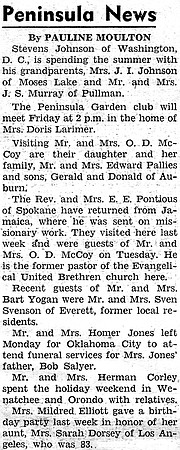Nat Washington discusses homesteading
Herald Columnist | Hagadone News Network | UPDATED 9 years, 5 months AGO
Grant County history E-mail from Cheryl
The Grant County Historical Society has compiled several volumes of Grant County history. The books are available for purchase at the Historical Society Museum gift shop in Ephrata.
These are memories of Grant County, compiled from taped interviews by the Grant County Historical Society.
Today we backtrack a bit and then continue Nat Washington’s story about Grand Coulee. He is presenting the picture of what his grandparents encountered after they moved to eastern Washington. Read on.
Each person who homesteaded had to have his own homestead cabin. It didn’t say you had to build it, so they were able to use these old cabins that were already there.
My dad homesteaded this particular area and this old log cabin was his homestead, but although he still practiced law in Almira, he had to come on weekends, drive a buggy down and spend at least weekends working on the place and living in his log cabin homestead shack.
They bought the land from the previous owners and took over their squatters rights in 1909. Then it was surveyed I believe it was 1911 or 1912. So by the time it was surveyed they had already lived their full three years, so they immediately got their patents to the land.
My granddad homesteaded where the old ranch house was. They built another little cabin right close to that for my aunt. She homesteaded another 160 acres that abutted that particular place.
It was really part of the overall operation. She had to stay there, but later on it was used as a bunkhouse, after she had proved up on the land.
My uncle homesteaded, and his homestead shack wasn’t already there, so they had to build this shack. I have a picture here showing that being built about a mile to the north towards the Coulee Dam, so he had to set up housekeeping and spend time there. But we had the four homesteads, my father, my aunt, my uncle, and my dad all had adjacent homesteads.
Then shortly after that they had what they called the additionals. Then you could take up additional land, so they were able to put together well over 1,000 acres in that area. It ended up as other people homesteaded later on and at that time weren’t able to make it and then they bought out the homesteaders next to it to finally get enough land to have a cattle operation.
More history from Nat Washington next week.
Note: This part of the story is a bit difficult to follow. It appears the additionals were allowed when a homesteader wasn’t able to make the land pay, so they were willing to sell to the Washington family.
Now the story of the apple orchard and this is one of the typical results it seems of the Washington family getting into agriculture and I think we’ve yet to make our first dollar.
But my grandfather was familiar with, apparently it had been used on the Shenandoah Valley at that time, a new device called a current pump. I’ve never seen one in operation. I saw some of the remnants of this old one on the ranch.
This pump involved a paddle, a long paddle on a boom that went from the pump out into the river. The current carried the paddle down and the end of the paddle activated a series of cogs. Those cogs operated a pump, which would put water with great force. It was enough to put it up about 100 feet up to the flat.
More from Nat Washington next week.
Facts from the past gleaned from the Moses Lake Herald, Columbia Basin Herald and The Neppel Record by Cheryl (Driggs) Elkins:
From the Columbia Basin Herald on July 10, 1952:
Block 40 to picnic
Block 40 settlers are invited to a picnic Sunday at Sun Lakes State Park, beginning at noon.
Lunsford wins A-Main event in stock races
Les Lunsford (98) of Ephrata took the A-main event in Sunday’s stock car races on the Legion Speedway, before a fair sized crowd that stayed in their own cars to get out of the dust.
Digger O’Dell (88) came in second followed by Histon Robinson (19) of Quincy, Roy Fuller (8) of Moses Lake and Louie Vitolo (77) of Soap Lake.
A Soap Lake man, Chuck Frazer, took the B-main, with only four cars running, following by Jack Sitton of Wilbur.
Best time was Curt Elshire’s, followed by Buzz Reed and Wayne Gardner. Eishire took the trophy dash to add to his points. Heat winners were Harold Chapman, Vitolo and O’Dell. The track was fast, smoother than before, with more work promised before the July 20 race. The Columbia Basin Stock Car Racing Association plans races here every other Sunday for the rest of the summer.
ARTICLES BY HERALD COLUMNIST

It began 25 years ago, but who's counting
Feb. 13, 1991 was a special day for me. The first weekly outdoors column began on this day with my name on it. Forgive me, as I puff my chest a bit, but 52 columns a year for 25 years comes out to an even 1,300.

Relocation camp life not all bad for Mae Higashiyama
Bits and Pieces

I'm blaming Papa Joe Wiggs and Ted Nugent
The mission involved hazing pesky elk from certain orchards in an area south of Wenatchee. These critters can cause thousands of dollars worth of damage if not trained to stay away.



